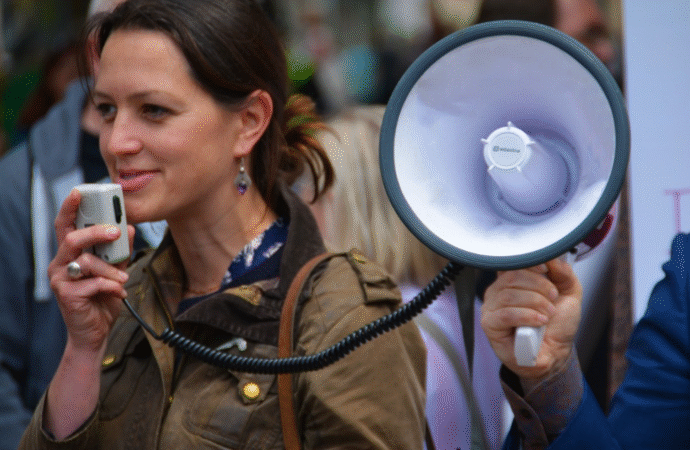Though I’ve never read J. K. Rowling – fantasy has rarely attracted my attention, a flaw in my literary tastes – I am fascinated by her courageous stance regarding sex and gender. Labeled “transphobic” by many on the left, Rowling has stood her ground, refusing to buckle to her attackers and receiving death threats for her belief that biological sex is a reality. As two hostile Rowling critics wrote, she believes that “womanhood is fixed, intrinsic, and anatomically fixed.”
Her tart rejoinders to some of her assailants rouse both my admiration and laughter. Recently, for example, when trans activists wrote that the writer looked like a trans man, that is, a woman who believes she is a man and wishes to display as such, Rowling responded tongue-in-cheek:
Attention all men telling me I look like a trans woman: I’m sensing that this isn’t meant as a compliment. In fact, the implication seems to be that trans women look male, or odd, or ugly. This is appallingly transphobic and I’ll thank you to take your bigotry off my timeline.
For me, as for Rowling, men and women are fixed entities in their sex. A glassworker can shape molten glass into a miniature tree, but that tree remains glass. Similarly, our chromosomes except in rare cases, determine our sex. Surgery, drugs and dress alter appearance, but not essence.
In the 21st century, particularly during the Covid pandemic and the presidency of Joe Biden, all sorts of politicians and government officials have attempted this sleight of hand, from those who promised a “vaccine” that would prevent Covid, to those who protected a president clearly suffering from dementia. They hid the truth while reimaging reality. Many in the corporate news media followed, some because of their political leanings, some from ignorance or sloth.
During that time those who spoke out, who dared proclaim, based on facts and evidence, that the emperor was naked, were pilloried, tarred-and-feathered with mockery and disdain, driven from social media, and even fired from their jobs. Like the press, the mob who attacked these truth-tellers were often too lazy to track down any evidence contrary to the government’s propaganda.
Because of such subterfuge and hokum, American trust in major institutions – government, media, science, universities and schools – has either declined precipitously or remains where it already was, in the basement. To reestablish that trust will likely take years, if not decades.
And herein lies a lesson for all of us. Truth is the foundation of trust, and trust is the foundation of successful human enterprises. Businesses, marriages, the relationship between parents and children, friendships: all fail when deceit enters the equation and erases trust, often forever.
Just as bad, or even worse, is when we deceive ourselves, as did so many in their advocacy for the Covid pandemic policies. In “The Many Ways We Lie to Ourselves,” Shahram Heshmat looks at such deceits as reality denial, as in alcoholics denying they have a problem; overconfidence – “90 percent of all drivers think they are above average”; and the “me and others” syndrome, as in “You failed, because you did not try hard enough; I failed, because I had a headache from staying up all night with my son.”
Of course, social lies are another matter. When a hostess asks what we thought of her exotic but horrible tasting dessert, good manners demand that we nod and say, “Delicious.” When my five-year-old granddaughter asked me if I was going to die soon, I laughed it off, saying, “Nope. I want to be there for your wedding.” Sticking around that long is within the realm of possibility, but death doesn’t run on a timetable, a fact she’s too young to understand. That deceit was intended to set her mind at ease and protect her innocence.
Those instances aside, when we rail against our leaders for deceiving us, we might consider glancing in the mirror and reflecting on those lies we’ve told, to others and to ourselves. Small matters, yes, compared to matters of state, but sooner or later deceit always delivers pain and mistrust.
“Don’t deal in lies,” wrote Kipling in his poem, “If.” Solzhenitsyn’s essay, “Live Not by Lies,” was aimed at the citizen vis-à-vis the state, but his admonition to avoid lies can be easily applied to individuals as well. Later, in his Nobel speech, he ended by citing a Russian proverb, “One word of truth shall outweigh the whole world.”
And as J. K. Rowling stated in 2020, “It isn’t hate to speak the truth.”
—
The republication of this article is made possible by The Fred & Rheta Skelton Center for Cultural Renewal.
Image Credit: Pxhere
24 comments















24 Comments
Patricia
July 1, 2025, 6:17 pmI get paid over 220 Dollars per hour working from home with 2 kids at home. i never thought i’d be able to do it but my best friend earns over 15k a month doing this and she convinced me to try. it was all true and has totally changed my life. This is what I do, check it out by Visiting Following Website
HERE—————⊃⫸ Www.NetPay1.Com
REPLYFeatherjourney@Patricia
July 2, 2025, 5:27 amEverybody can earn 220$/h + daily 1K… You can earn from 6000-12000 a month or even more if you work as a part time Work…It’s easy, just follow instructions on this page, read it carefully from start to finish… It’s a flexible job but a good eaning opportunity..go to this site home tab for more detail thank you…….
REPLY.
Reading This Article:———- https://Www.Cash43.Com
LawrenceMJones@Patricia
July 3, 2025, 6:43 amGoogle pay 500$ per hour my last pay check was $19840 working 10 hours a week online. My younger brother friend has been averaging 22k for months now and he works about 24 hours a week.
REPLYJust Open This Website…….. http://www.get.money63.com
EMMA@LawrenceMJones
July 3, 2025, 12:13 pmI’m making over $13k a month working part time. I kept hearing other people tell me how much money they can make online so I decided to look into it. Well, it was all true and has totally changed my life. This is where I started
REPLY.
Reading This Article:—– http://Www.Payathome9.Com
LawrenceMJones@Patricia
July 3, 2025, 6:45 amGoogle pay 500$ per hour my last pay check was $19840 working 10 hours a week online. My younger brother friend has been averaging 22k for months now and he works about 24 hours a week.
REPLYJust Open This Website…….. http://www.get.money63.com
MaritzaJHanson
July 2, 2025, 2:26 amI get paid more than $90 to $120 per hour for working online. I heard about this job 3 months ago and after joining this I have earned easily $20k from this without having online working skills . Simply give it a shot on the accompanying site…
Here is I started.…………>>Www.Join.Work43.Com
REPLYMelvaDStringer
July 2, 2025, 3:15 amEvery month easily makes more than $15k just by doing very simple home based job. Last month i have received $16834 from this online job just by doing this in my part time for only 2 hrs maximum a day. Very simple to do job and earning from this are just awesome. Every person on this earth can now get this job and start earning money online right now just by follow instructions
click here……….. https://Www.JoinSalary.Com
REPLYJeffrey C. Williams
July 2, 2025, 3:29 amɪᴍ ᴍᴀᴋɪɴɢ ᴏᴠᴇʀ 𝟷𝟹ᴋ ʙᴜᴄᴋs ᴀ ᴍᴏɴᴛʜ ᴡᴏʀᴋɪɴɢ ᴘᴀʀᴛ ᴛɪᴍᴇ. ɪ ᴋᴇᴘᴛ ʜᴇᴀʀɪɴɢ ᴏᴛʜᴇʀ ᴘᴇᴏᴘʟᴇ ᴛᴇʟʟ ᴍᴇ ʜᴏᴡ ᴍᴜᴄʜ ᴍᴏɴᴇʏ ᴛʜᴇʏ ᴄᴀɴ ᴍᴀᴋᴇ ᴏɴʟɪɴᴇ sᴏ ɪ ᴅᴇᴄɪᴅᴇᴅ ᴛᴏ ʟᴏᴏᴋ ɪɴᴛᴏ ɪᴛ. ᴡᴇʟʟ, ɪᴛ ᴡᴀs ᴀʟʟ ᴛʀᴜᴇ ᴀɴᴅ ʜᴀs ᴛᴏᴛᴀʟʟʏ
ᴄʜᴀɴɢᴇᴅ ᴍʏ ʟɪғᴇ…..➤➤ https://Www.Pay.Works6.Com
REPLYThomasWGant
July 2, 2025, 3:30 amThis is a really simple method to keep making money. There are a lot of ways I can earn money from home……… http://Www.Works6.Com
REPLY